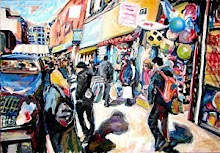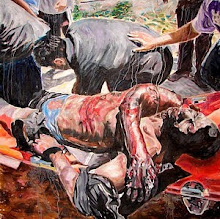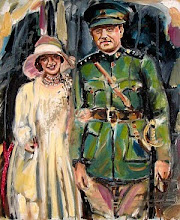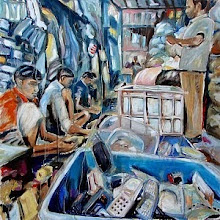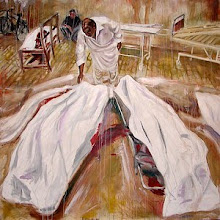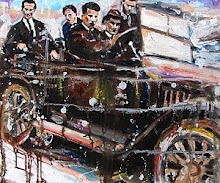The
Counter-Enlightenment is the name given to the oppositional forces that
formed during the Enlightenment that fought against the philosophes' writings on democracy, republicanism and toleration. These forces were known as the anti-philosophes and sought to maintain the dominance of the monarchy and the church.
The
philosophes (French for 'philosophers') were eighteenth century
intellectuals
who "applied reason to the study of many areas of learning, including
philosophy, history, science, politics, economics and social issues."
Most importantly, they believed in progress and tolerance and in many
different ways sought to highlight injustice and seek ways of changing
society for the better.
The anti-
philosophes rose up to
defend 'throne and altar' and over time many of the ideals of the
anti-philosophes were taken over by Romanticism in the nineteenth
century, and the conservative politics of the twentieth century, for
example, in Western
culture,
"depending on the particular nation, conservatives seek to promote a
range of social institutions such as the nuclear family, organized
religion, the military, property rights, and monarchy."

Caricature of the
Third
Estate carrying the First Estate (clergy) and the Second Estate
(nobility) on its back. "You should hope that this game will be over
soon."
The
origins of right-wing politics in Europe are often attributed to Edmund
Burke (1729–1797), the Irish philosopher, who is seen as the
philosophical father of modern conservatism. His book,
Reflections on the Revolution in France,
is a criticism of the French Revolution, which itself was partly fueled
by the writings of the philosophes, thus setting up the dividing lines
between the supporters of radical republicanism and revolution, in
opposition to the supporters of the older monarchy and church of the
ancien régime.
The
idea of the Counter-Enlightenment is itself controversial as some
academics argue that an organised force against the Enlightenment was
non-existent, or at the very least, a complex debate. For example,
Jeremy L. Caradonna ('There Was No Counter-Enlightenment') and Robert E.
Norton ('The Myth of the Counter-Enlightenment') both look at
contradictory aspects of the individuals called anti-
philosophes. As has been noted the
thinkers
of the Counter-Enlightenment "did not necessarily agree to a set of
counter-doctrines but instead each challenged specific elements of
Enlightenment thinking, such as the belief in progress, the rationality
of all humans, liberal democracy, and the increasing secularisation of
society."
It was Isaiah Berlin (1909–1997), the Russian-British
social and political theorist, philosopher, and historian of ideas who
popularised the term in his essay 'The Counter-Enlightenment'. Berlin
was critical of the irrationalism of the early conservative figures from
the 1700s such as Joseph de Maistre, Giambattista Vico, and J. G.
Hamann. He also examined the German reaction to the French Enlightenment
and Revolution as the main source of reaction to the Enlightenment in
general and which eventually led to the Romanticist movement. Berlin
noted that:
"Such influential writers such as Voltaire,
d'Alembert and Condorcet believed that the development of the arts and
sciences was the most powerful human weapon in attaining these ends
[e.g. satisfaction of basic physical and biological needs, peace,
happiness, justice etc] and the sharpest weapon in the fight against
ignorance, superstition, fanaticism, oppression and barbarism, which
crippled human effort and frustrated man's search for truth and
self-direction." [1]
Writers like Darrin M. McMahon have looked
at the early opponents of the Enlightenment in pre-Revolutionary France,
while Graeme Garrard has shown in detail the conservative
counter-Enlightenment ideas of Jean-Jacques Rousseau, a very different
perspective on one of the heroes of the French Revolution.
In this essay I will look at the individuals and groups who took a stand against the
philosophes through their movements, books, and journals in support of the church and monarchy.
Early opposition to the EnlightenmentOpposition to the philosophes of the Enlightenment did not start with the French Revolution. According to McMahon in his book
Enemies of the Enlightenment:
"Only recently have scholars begun to acknowledge that conservative salons existed in the eighteenth century in which the
philosophes' ideas were regarded with horror..." [2]
Many writers in France mocked the progressive ideas of the
philosophes in
"a host of satirical plays, libels, and novels published in the late
1750s, 1760s and early 1770s". [3] McMahon comments that: "It stands to
reason that the reaction to the Enlightenment should also have occurred
first in the place of its birth and been spearheaded by the very
institution - the Catholic Church charged with maintaining the faith and
morals of the realm". [4]
This can be seen, for example, in the Frontispiece to the physician Claude-Marie Giraud's
Epistle from the Devil to M. Voltaire
which chronicled Voltaire's 'traffic with Satan', and was republished
over thirty times between 1760 and the outbreak of the Revolution.

"Frontispiece to the physician Claude-Marie Giraud's Epistle from the Devil to M. Voltaire.
This brief work, chronicling Voltaire's traffic with Satan, was
republished over thirty times between 1760 and the outbreak of the
Revolution."
(Image: Bibliothèque Nationale, Paris. Text:
Darren McMahon, Enemies of the Enlightenment: The French
Counter-Enlightenment and the Making of Modernity (Oxford, 2002)
p.20)
The adverse reaction to
the ideas of the philosophes was evident in the hundreds of books,
pamphlets, sermons, essays, and poems written against them, as well as
becoming the raison d'être of journals such as the Anée littéraire, the Journal historique et littéraire, and the Journal ecclésiastique. [5] McMahon writes about how the enemies of 'throne and altar' and their 'treasonous' activities were perceived by the anti-philosophes :
"The anti-philosophes saw the philosophes as
'enemies of the state', 'evil citizens', 'declared adversaries of
throne and altar', and unpatriotic subjects guilty of human and divine
treason. [...] Thus, the anti-philosophes frequently accused their opponents of spreading "republican" and "democratic" ideas. The philosophes,
they claimed, preached the sovereignty of the people, advocated
"perfect equality," and spoke endlessly of "social contracts." They
lauded the political institutions of the United Kingdom, spreading a
contagious "Anglomania" that held up Parliament and the limitations
placed on the powers of the English crown as models to be emulated in
France. And they talked ad nauseum of "liberty and equality," natural rights and the "rights of the people" without ever mentioning duties and obligations." [6]
They
even appealed to the new dauphin [The distinctive title (originally
Dauphin of Viennois) of the eldest son of the king of France, from 1349
till the revolution of 1830] to be wary of the new anti-religious
attitude that was being spread by the philosophes: "From this
anarchy of the physical and moral universe results, necessarily, the
overthrow of thrones, the extinction of sovereigns, and the dissolution
of all societies. Oh Kings! Oh Sovereigns! Will you be strong enough to
stay on your thrones if this principle ever prevails?" [7]
"The 1757 frontispiece to the first volume of Jean Soret and Jean-Nicolas-Hubert Hayer's anti-philosophe journal, La Religion vengée, ou Réfutation des auteurs impies.
True philosophy, in possession of the keys to the church, presents a
copy of the work to the dauphin, Louis Ferdinand, who looks on
approvingly as religion and wisdom trample false philosophy under foot.
The latter bears a sign which reads in Latin, "He said that there is no
God.""
(Image: Bibliothèque Nationale, Paris. Text:
Darren McMahon, Enemies of the Enlightenment: The French
Counter-Enlightenment and the Making of Modernity (Oxford, 2002) p.22)
The power of the philosophes'
ideas could be seen in their influence on the French Revolution of 1789
and in particular on the human civil rights document, the Declaration
of the Rights of Man and of the Citizen (French: Déclaration des droits
de l'Homme et du citoyen de 1789) which was adopted on the 26 of August
1789 by the National Constituent Assembly during the French Revolution.
Ultra-Royalist reaction
However,
the Ultra-Royalist reaction, the nobility of high society who strongly
supported Roman Catholicism as the state and only legal religion of
France, as well as the Bourbon monarchy, initiated what became known as
the Second White Terror, a counter-revolution against the French
Revolution.
It provided an opportunity for the
counter-Enlightenment conservatives to get their revenge on the
revolutionaries, taking the form of militant struggle that resulted in
bloody consequences. For example:
"the Ultra-Royalist assembly
returned after the upheaval of the Hundred Days, this conservative
revolution set out to cleanse France of the men and spirits of 1789.
Throughout the country, exceptional courts and special jurisdictions
tried and punished revolutionary criminals. In the civil service and
royal administration as many as fifty thousand to eighty thousand former
officials were stripped of their positions, and in the church, the
army, and the universities, similar purges were encouraged, although on a
smaller scale. In the provinces, particularly in the Midi, marauding
gangs took matters into their own hands, hunting down revolutionary
collaborators and settling old scores in a great bloodletting known as
the White Terror." [8]
However, the Terror worried even
the king himself as in 1816 Louis XVIII dissolved the chambre
introuvable, to the great horror of the Catholic Right: "Louis feared
its intransigent refusal to compromise with any vestige of the
Revolution, its exaggerated religiosity, and its resolute efforts to
exact retribution from the "criminals" who had sullied France." Thus the
conservative pro-monarchy forces had become even more royalist than the
king himself. [9]
The Chambre
introuvable
(French for "Unobtainable Chamber") was the first "Chamber of Deputies
elected after the Second Bourbon Restoration in 1815. It was dominated
by Ultra-royalists who completely refused to accept the results of the
French Revolution."
The conservative ideas of the Ultras, for
example, "the weight of history, the primacy of the social whole, the
centrality of the family, the necessity of religion, and the dangers of
tolerance" found their way into many right-wing and conservative
ideologies of Europe in the nineteenth and twentieth centuries. [10]
Rousseau's turn against reason and scienceSimilarly,
Jean-Jacques Rousseau's conservative turn laid the groundwork for the future
irrationalist Romanticist movement. Despite Rousseau's popularity as a
philosopher of the French Revolution, Rousseau ultimately went against
the rationalism and intellectualism of the eighteenth century and moved
towards a philosophy based on emotion, imagination and religion.

"Flee, vile imposters, no longer sully this temple", the frontispiece to Pierre-Victor-Jean Berthre de Bourniseaux, Le Charlatanisme dans tous les âges dévoilé
(Paris, 1807). Angels of the Lord banish the philosophes from the
Temple of Truth. In the foreground, Voltaire, Rousseau, La Mettrie,
Plato,and other philosophes flee in despair.
(Image: Bibliothèque Nationale, Paris. Text:
Darren McMahon, Enemies of the Enlightenment: The French
Counter-Enlightenment and the Making of Modernity (Oxford, 2002) book cover).
According to Graham Garrard in Rousseau's Counter-Enlightenment:
"Rousseau's
"unequivocal preference was for the "happy ignorance" of Sparta over
Athens, that "fatherland of the Sciences and the Arts" the philosophes
so much admired. He regarded virtue as much more important than
knowledge or cognitive ability; a good heart is worth inestimable more
than the possession of knowledge or a cultivated intellect, he thought"
and concludes that "relying on reason - as philosophers do - "far from
delivering me from my useless doubts, would only cause those which
tormented me to multiply and would resolve none of them. Therefore, I
took another guide, and I said to myself, 'Let us consult the inner
light'"." [11]
Rousseau's inward looking attitude and distrust of reason resulted in a very different kind of politics than the philosophes had imagined, as Garrard writes:
"Unlike
the foundation of political society envisaged by Hobbes and Locke,
[Rousseau] stresses the need for a legislator who relies principally on
religion and myth rather than reason, self interest, or fear to "bind
the citizens to the fatherland and to one another." [...] For Rousseau,
religion substitutes for reason as the cement of society and the means
of inducing respect for the laws. [...] Rousseau's legislator is a
prophet and (perhaps) a poet, whose "magic" produces a nation, rather
than a philosopher who appeals to reason." [12]
For
Rousseau the spread of knowledge was to be controlled and funnelled into
localist communities and beliefs, away from modern conceptions of the
nation state:
"Rousseau was opposed to the popularization of knowledge, not to knowledge per se.
In his final reply to critics of his first Discourse, he clarifies
position by stressing this distinction between knowledge and its
dissemination. "[I]t is good for there to be Philosophers, "he writes,
"provided that the People doesn't get mixed up in being Philosophers"."
[13]
Leo Strauss's sentiments exactly! Knowledge as a set
of myths that would keep the masses happy but not the kind of
universalist knowledge that might lead them to revolt:
"The key
to Rousseau's patriotic program is what he referred to as a "truly
national education." Unlike the "party of humanity," [the philosophes] he called for
education to be put entirely in the service of particular national
communities in order to prevent the corrosive spread of universal ideas
and beliefs. He rejected the view put forth by the philosophes that the universal arts and sciences are an adequate basis for political community." [14]

"The Despair of the philosophes. Frontispiece to the 1817 edition of the prolific anti-philosophe Élie Harel's Voltaire: Particularités curieuses de sa vie et de sa mort, new ed. (Paris, 1817). Christ reigns supreme over a fallen medusa, who vomits up the Encyclopédie, Rousseau's Émile, Voltaire's Dictionnaire philosophique, and other key Enlightenment texts."
(Text: Darren McMahon, Enemies of the Enlightenment: The French
Counter-Enlightenment and the Making of Modernity (Oxford, 2002) p.161)
Moreover,
Rousseau advocated the use of catharsis and 'bread and circuses' to
maintain loyalty to the patriotic fatherland (and thereby stymieing any
type
of burgeoning class consciousness):
"Rousseau also advised
would-be legislators to establish "exclusive and national" religious
ceremonies; games which "[keep] the Citizen frequently assembled;"
exercises that increase their national "pride and self esteem;" and
spectacles which, by reminding citizens of their glorious past, "stirred
their hearts, fired them with a lively spirit of emulation, and
strongly attached them to the fatherland with which they were being kept
constantly occupied"." [15]
Rousseau opens one of his most famous books, The Social Contract,
with the words 'Man is born free, but is everywhere in chains' yet this
was a far cry from Marx's 'You have nothing to lose but your chains',
as Rousseau refers to rising up against a tyrant, not rising up against
one's own slavery. Especially not the 'respectable rights' of 'masters
over their servants':
"The Protestant, republican Rousseau
bristled with indignation at the thought of his hardy, virtuous Genevans
watching the cynical comedies of Moliere who, "for the sake of
multiplying his jokes, shakes the whole order of society; how
scandalously he overturns all the most sacred relations on which it is
founded; how ridiculous he makes the respectable rights of fathers over
their children, of husbands over their wives, of masters over their
servants!"" [16]
Rousseau's move away from enlightened
humanism to authoritarianism can be seen in his attitude towards the
state whereby any "attempt to liberate a prisoner, even if unjustly
arrested, amounts to rebellion, which the state has a right to punish."
[17]
If we compare this to Voltaire's involvement in
L'affair Calas
we see a very different attitude, as Voltaire fought in defence of a
Huguenot merchant who was broken on the wheel for a crime that he had
not committed.
Furthermore, Rousseau believed that "The
taste for letters, philosophy, and the fine arts softens bodies and
souls. Work in the study renders men delicate, weakens their
temperament, and the soul retains its vigour with difficulty when the
body has lost its vigour. Study uses up the machine, consumes spirits,
destroys strength, enervates courage. ... Study corrupts his morals,
impairs his health, destroys his temperament, and often spoils his
reason." [18]
The Enlightenment
philosophes thought
the opposite: "The less men reason, the more wicked they are," wrote
the Baron d'Holbach. "Savages, princes, nobles and the dregs of the
people, are commonly the worst of men, because they reason the least."
[19]
The Counter-Enlightenment and Romanticist ideas todayThe
Enlightenment seems to get blamed for everything these days. In an
article titled 'Enlightenment rationality is not enough: we need a new
Romanticism', the author Jim Kozubek
writes:
"From
the use of GMO seeds and aquaculture to assert control over the food
chain to military strategies for gene-engineering bioweapons, power is
asserted through patents and financial control over basic aspects of
life. The French philosopher Michel Foucault in
The Will to Knowledge (1976) referred to such advancements as ‘techniques for achieving the subjugation of bodies and the control of populations’."
Foucault does at least remark on a basic aspect of the problem: subjugation and control.
Kozubek
comments
that "science is exploited into dystopian realities – such fraught
areas as neo-eugenics through gene engineering and unequal access to
drugs and medical care" but notes that "The biggest tug-of-war is not
between science and religious institutional power, but rather between
the primal connection to nature and scientific institutional power."
Historically,
the Enlightenment was a battle between the church and the new
scientific approaches to knowledge in the 18th century. The philosophes wrote
against the power of the church and the monarchies and developed
progressive ideas about democracy and republicanism, torture and the
death penalty, toleration, fraternity, constitutional government, and
separation of church and state.
In the
frontispiece
to Voltaire's book on Newton's philosophy, Émilie du Châtelet appears
as Voltaire's muse, reflecting Newton's heavenly insights down to
Voltaire.
However, this universalising philosophy and writing against injustice of the Enlightenment
philosophes is
missing from modern analyses of Romanticism, that by the 19th century
those battles had developed into the Romanticist 'primal connection to
nature' versus capitalist technocracy. Yet, what the Romanticists and
the technocrats did have in common was that neither questioned slavery:
whether it be the slavery of feudalism (which the Romanticists liked to
hark back to), or the wage slavery of modern capitalism (which the
technocrats prefer to ignore).
In fact, the Romanticists and the
technocrats helped each other in a reactionary symbiotic relationship
that perpetuated the status quo: the
Romanticists had always used technology (to indulge their fantasies, for
example, train technology brought them to gaze in awe at the 'mystical'
Alps), while the technocrats used Romanticism to create diversion and
escapism for the masses (thereby avoiding mass uprisings and
revolution). This can be seen in the almost wholly Romanticist culture
of fantasy, terror, horror, superheroes etc that dominates global modern
culture today in the era of global monopoly capitalism.
The
Enlightenment and its opposing counter-Enlightenment, represented the
main ideological battles of the eighteenth and early nineteenth century,
but as people became less and less religious over the ensuing century,
Romanticism took over from the irrationalism of the church as the main
counter-progressive force in society.
This can be seen also in
the 'suspicion of reason' contained in the definitions of the
post-Romanticist ideologies of Modernism and Postmodernism, and the
outright return to Romanticism of Metamodernism. Once the bourgeois
revolutions of '
liberté, égalité, fraternité' had been carried
through, the universalist ideas of the
philosophes were quietly dropped
and the anti- (wage) slavery torch passed on to the revolutionary
socialists.
It seems that the role of Romanticist movements
(including Modernism, Postmodernism, and Metamodernism) is to react to
any burgeoning progressive movement, to suck the life blood out of it
and while not necessarily killing it, to at least leave it extremely
weakened and non-threatening.
Meanwhile, any obvious lack of
consistency in Romanticist movements merely points to, and demonstrates
its reactive nature. For example, Romanticist neo-Gothic is full of
decoration, yet Romanticist (Modernist) Minimalism, in the form of
Bauhaus, for example, is completely devoid of decoration.
McMahons description of the anti-
philosophes confirms that reactive view:
"If the
philosophes assailed religion, then the anti-
philosophes must protect it. If the
philosophes attacked the king, then his authority must be upheld. If the
philosophes vaunted the individual, then the social whole must be defended. If the
philosophes corrupted the family, then its importance must be reaffirmed. And if the
philosophes advocated change, then the anti-
philosophes must prevent it". [20]
While
the Right may not be able to get away with arguments for the
re-establishment of monarchies these days, their ideology is still
rooted in organized religion and the social teachings of the church,
(combined with the military, and property rights).
The
philosophes were
progressive thinkers who struggled for radical changes against the
injustices of their time. Their universalist writings on liberty,
progress, toleration, fraternity, constitutional government, and
separation of church and state are just as important in the world today
as they have ever been, especially in an era of increasing globalised
poverty
where one
billion people worldwide live in slums (and yet this figure is projected
to grow to 2 billion by 2030) and which is exacerbated by rising
inflation and the impacts of war. It is time now for new thinking that is
not dominated by the selfish political and war agendas of the
billionaire media machine.
Notes:
[1] Isaiah Berlin,'The Counter-Enlightenment', Against the Current: Essays in the History of Ideas (Pimlico, 1997) p.3
[2] Darren McMahon, Enemies of the Enlightenment: The French
Counter-Enlightenment and the Making of Modernity (Oxford, 2002) p.24
[3] Darren McMahon, Enemies of the Enlightenment: The French
Counter-Enlightenment and the Making of Modernity (Oxford, 2002)
p.24
[4] Darren McMahon, Enemies of the Enlightenment: The French
Counter-Enlightenment and the Making of Modernity (Oxford, 2002) p.9
[5]
Darren McMahon,
Enemies of the Enlightenment: The French
Counter-Enlightenment and the Making of Modernity (Oxford, 2002)
p.27
[6]
Darren McMahon, Enemies of the Enlightenment: The French
Counter-Enlightenment and the Making of Modernity (Oxford, 2002) p.41/42
[7]
Darren McMahon, Enemies of the Enlightenment: The French
Counter-Enlightenment and the Making of Modernity (Oxford, 2002) p.43
[8]
Darren McMahon, Enemies of the Enlightenment: The French
Counter-Enlightenment and the Making of Modernity (Oxford, 2002) p.156
[9]
Darren McMahon, Enemies of the Enlightenment: The French
Counter-Enlightenment and the Making of Modernity (Oxford, 2002) p.157
[10] Darren McMahon, Enemies of the Enlightenment: The French
Counter-Enlightenment and the Making of Modernity (Oxford, 2002) p.200
[11]
Graeme Garrard, Rousseau's Counter-Enlightenment: A Republican Critique of the Philosophes, (SUNY, 2003) p.84
[12] Graeme Garrard, Rousseau's Counter-Enlightenment: A Republican Critique of the Philosophes, (SUNY, 2003) p.59
[13] Graeme Garrard, Rousseau's Counter-Enlightenment: A Republican Critique of the Philosophes, (SUNY, 2003) p.91
[14] Graeme Garrard, Rousseau's Counter-Enlightenment: A Republican Critique of the Philosophes, (SUNY, 2003) p.62
[15] Graeme Garrard, Rousseau's Counter-Enlightenment: A Republican Critique of the Philosophes, (SUNY, 2003) p.62
[16] Graeme Garrard, Rousseau's Counter-Enlightenment: A Republican Critique of the Philosophes, (SUNY, 2003) p.64
[17] Graeme Garrard, Rousseau's Counter-Enlightenment: A Republican Critique of the Philosophes, (SUNY, 2003) p.80
[18]
Graeme Garrard, Rousseau's Counter-Enlightenment: A Republican Critique of the Philosophes, (SUNY, 2003) p.88
[19] Graeme Garrard, Rousseau's Counter-Enlightenment: A Republican Critique of the Philosophes, (SUNY, 2003) p.88
[20] Darren McMahon, Enemies of the Enlightenment: The French
Counter-Enlightenment and the Making of Modernity (Oxford, 2002) p.53
Caoimhghin Ó Croidheáin is an Irish artist, lecturer and writer. His artwork
consists of paintings based on contemporary geopolitical themes as well
as Irish history and cityscapes of Dublin. His blog of critical writing
based on cinema, art and politics along with research on a database of
Realist and Social Realist art from around the world can be viewed
country by country here.
Caoimhghin has just published his new book – Against Romanticism: From
Enlightenment to Enfrightenment and the Culture of Slavery, which looks
at philosophy, politics and the history of 10 different art forms
arguing that Romanticism is dominating modern culture to the detriment
of Enlightenment ideals. It is available on Amazon (amazon.co.uk) and the info page is here.






